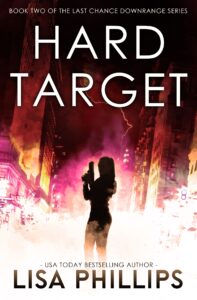By Lisa Phillips, @LisaPhillipsbks
Yes, I’m a suspense author.
Yes, I’m saying your book should be character driven. Always.
A lot of times in craft talks or writing books you’ll find a distinction between what’s referred to as a “character driven” story and those that are called a “plot driven” one. As if we’re supposed to choose. Or naturally we’ll gravitate toward one rather than the other.
There’s an element of truth to it. But just because something is what we’ve always done, or what we’re told, doesn’t mean it’s how things are supposed to be.
Character driven typically refers to genres like romance, or women’s fiction. The driving force in the forward motion of the story is the character themselves.
A book described as plot driven on the other hand would indicate to the writer that this type of story has a different source of momentum – the action of the plot. The threat. The mystery that needs to be solved.
However, when faced with writing advice from anyone anywhere it’s important at every step with every piece of information that we QUESTION THE PREMISE. There’s an inherent assumption in everything we read.
Every piece of language contains the writer’s experiences, conclusions they’ve drawn, what’s worked and hasn’t worked for them.
You need to figure out what works for you.
Yes, I want my story to be rich with complex main characters that are a force unto themselves.
I also want a high concept plot full of crazy stakes – private and public – that will blow the reader away.
I want both.
The basis of storytelling is the main character. Without a character you have no story. The events of the plot have no context, no meaning, and nothing to move them forward. A ball sits on the ground until it is kicked or thrown. Or the wind blows it. There is no motion without energy.
The character is the source of your story’s energy.
A high concept plot with crazy stakes is nothing without a character to move it forward. A force to act upon the events of the plot. Some characters are a strong force (hello Jack Reacher) and others are a weak force, or the story simply requires a softness of action about the character.
In deep point of view we see everything in the story from inside the head of the POV character. We are shown the world through their eyes. The character translates the events of the plot, the dialogue or actions of other characters, through the lens of who they are.
Every person in the world is the sum of their experiences. Their values. What they’ve learned. Fallacies they have taken onboard as truth. Truths they have learned and those they have yet to learn. Every day in your life is the chance to either fall back or move forward, or you allow yourself to grow because you don’t like either other option—here’s a little of me peeking through.

We all have unique strengths. We all process our emotions in a personal way. We’ve been taught different things. We’ve taken on board what we’ve been repeatedly told. The way we were raised. How we learned, and what the lesson was. We walk into a situation believing one thing, get knocked down, and take on board something that seems like a truth but is in fact a lie we’re going to believe. We just don’t know it.
It’s the same with your characters.
A female main character who was taught to believe she will never amount to anything will receive a commendation at work completely differently than a character who believes that commendation is their due.
The female in this example will be overwhelmed. She’ll be surprised and overjoyed. She’ll walk that way, and speak from that place. Her acceptance speech will be full of gratitude.
A character who believes the commendation is their due will strut. Snatch the trophy. Say two mumbled words that might’ve been thanks, sneer at the competition…and go back to the bar.
The same plot beat is happening. “Character accepts commendation.” But these are two very different scenes.
“In each scene, what happens externally is driven by, and gets its meaning from, your protagonist’s internal reaction to it.” (Story Genius, Lisa Cron.)
For every scene you write, begin with who the POV character will be. (The person with the most at stake.)
Note down what their goal is. What do they want out of this scene?
Ask yourself what is at risk if they don’t get it.
But don’t stop there…
Why does what’s happening matter to your POV character?
- What does it mean to who they are, what they believe, and what they want (their goal) that this is happening?
- How do they translate what’s happening in light of what they believe about themselves and the world? Character A (the grateful female) is beginning to feel the plot shatter the lie that she doesn’t deserve happiness. The dominos of her internal arc are starting to fall. Character B is in denial that he needs to change, so your commendation beat is probably in Act 1, and the way he reacts will tell the reader that he needs to learn something even if he isn’t aware—or interested.
They realize something as a result of the external events of the plot, and why they matter.
- This realization drives the end note of the scene. Because of the commendation, character A is going to take a step of faith and apply for a promotion. Character B will place a huge bet on a sporting event – after all he can’t lose, so what’s the harm? – and we can all see that trainwreck coming.
“Your protagonist’s internal agenda is not simply what gives emotional weight and meaning to what’s happening up there on the surface; it’s also what drives the decisions she makes, and therefore the action.” (Story Genius, Lisa Cron.)
Without character you have no story.
And without the internal arc, your story can’t touch the reader.
Let’s go write something brilliant.
A new start.
An all too familiar threat.
Burned by the CIA, Lyric Thompson signed on with the Accountant’s Office for the fresh start she needed. Running a resort of vacation cabins—the site of more than one murder—isn’t going exactly to plan, but she wasn’t trained to quit. When a developer puts the pressure on, she has to choose to fight back alone…or accept help from the one man she never let go of.
Isaac Amrakov has never been given the chance to plot his own course. When the Accountant’s Office offers him a new life in Benson, he doesn’t know just how much God plans to restore in his life. But the construction crew he’s signed on with are up to something. The man he wants to be would wade in, but Isaac can’t do the right thing and keep Lyric safe at the same time. Not without putting everything he wants in jeopardy.
These two trained operatives are in for the fight of their lives. But will they stand together, or let life tear them apart again?
This stand-alone story is part of the accountant’s office series, Last Chance Downrange.
An all-new setting. An all-new set of characters.
USA Today and top ten Publishers Weekly bestselling author Lisa Phillips is a British ex-pat who grew up an hour outside of London. Lisa attended Calvary Chapel Bible College, where she met her husband. It wasn’t until her Bible College graduation that she figured out she was a writer (someone told her). Since then she’s discovered a penchant for high-stakes stories of mayhem and disaster where you can find made-for-each-other love that always ends in happily ever after.
Find out more at www.authorlisaphillips.com



